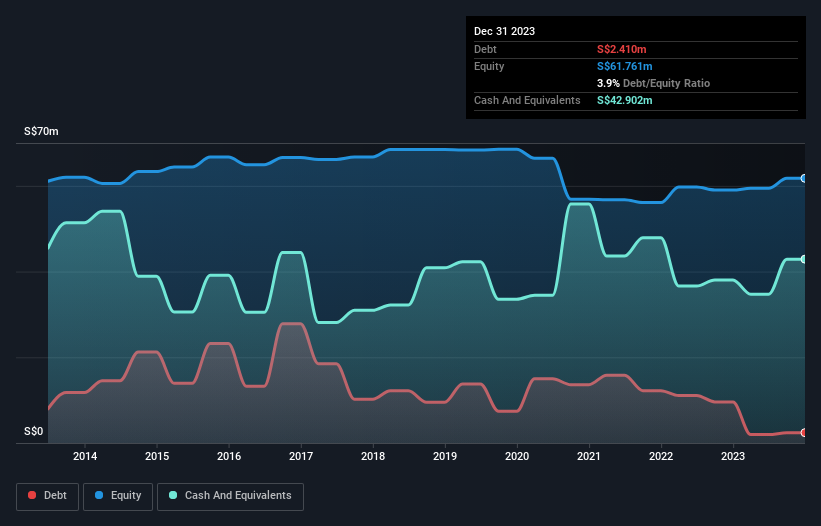Warren Buffett famously said, 'Volatility is far from synonymous with risk.' It's only natural to consider a company's balance sheet when you examine how risky it is, since debt is often involved when a business collapses. Importantly, Intraco Limited (SGX:I06) does carry debt. But should shareholders be worried about its use of debt?
When Is Debt A Problem?
Generally speaking, debt only becomes a real problem when a company can't easily pay it off, either by raising capital or with its own cash flow. Part and parcel of capitalism is the process of 'creative destruction' where failed businesses are mercilessly liquidated by their bankers. However, a more frequent (but still costly) occurrence is where a company must issue shares at bargain-basement prices, permanently diluting shareholders, just to shore up its balance sheet. Of course, plenty of companies use debt to fund growth, without any negative consequences. When we think about a company's use of debt, we first look at cash and debt together.
View our latest analysis for Intraco
What Is Intraco's Debt?
The image below, which you can click on for greater detail, shows that Intraco had debt of S$2.41m at the end of December 2023, a reduction from S$9.59m over a year. However, it does have S$42.9m in cash offsetting this, leading to net cash of S$40.5m.

A Look At Intraco's Liabilities
According to the last reported balance sheet, Intraco had liabilities of S$16.6m due within 12 months, and liabilities of S$707.0k due beyond 12 months. On the other hand, it had cash of S$42.9m and S$18.9m worth of receivables due within a year. So it actually has S$44.5m more liquid assets than total liabilities.
This luscious liquidity implies that Intraco's balance sheet is sturdy like a giant sequoia tree. Having regard to this fact, we think its balance sheet is as strong as an ox. Succinctly put, Intraco boasts net cash, so it's fair to say it does not have a heavy debt load!
Although Intraco made a loss at the EBIT level, last year, it was also good to see that it generated S$2.3m in EBIT over the last twelve months. The balance sheet is clearly the area to focus on when you are analysing debt. But you can't view debt in total isolation; since Intraco will need earnings to service that debt. So when considering debt, it's definitely worth looking at the earnings trend. Click here for an interactive snapshot.
Finally, a company can only pay off debt with cold hard cash, not accounting profits. Intraco may have net cash on the balance sheet, but it is still interesting to look at how well the business converts its earnings before interest and tax (EBIT) to free cash flow, because that will influence both its need for, and its capacity to manage debt. Happily for any shareholders, Intraco actually produced more free cash flow than EBIT over the last year. That sort of strong cash conversion gets us as excited as the crowd when the beat drops at a Daft Punk concert.
Summing Up
While it is always sensible to investigate a company's debt, in this case Intraco has S$40.5m in net cash and a strong balance sheet. And it impressed us with free cash flow of S$9.5m, being 415% of its EBIT. So we don't think Intraco's use of debt is risky. There's no doubt that we learn most about debt from the balance sheet. But ultimately, every company can contain risks that exist outside of the balance sheet. These risks can be hard to spot. Every company has them, and we've spotted 2 warning signs for Intraco you should know about.
Of course, if you're the type of investor who prefers buying stocks without the burden of debt, then don't hesitate to discover our exclusive list of net cash growth stocks, today.
New: AI Stock Screener & Alerts
Our new AI Stock Screener scans the market every day to uncover opportunities.
• Dividend Powerhouses (3%+ Yield)
• Undervalued Small Caps with Insider Buying
• High growth Tech and AI Companies
Or build your own from over 50 metrics.
Have feedback on this article? Concerned about the content? Get in touch with us directly. Alternatively, email editorial-team (at) simplywallst.com.
This article by Simply Wall St is general in nature. We provide commentary based on historical data and analyst forecasts only using an unbiased methodology and our articles are not intended to be financial advice. It does not constitute a recommendation to buy or sell any stock, and does not take account of your objectives, or your financial situation. We aim to bring you long-term focused analysis driven by fundamental data. Note that our analysis may not factor in the latest price-sensitive company announcements or qualitative material. Simply Wall St has no position in any stocks mentioned.
About SGX:I06
Intraco
An investment holding company, engages in the trading and distribution of plastics resin in Singapore, Vietnam, Indonesia, China, Malaysia, India, Australia, and internationally.
Excellent balance sheet and slightly overvalued.
Market Insights
Community Narratives




